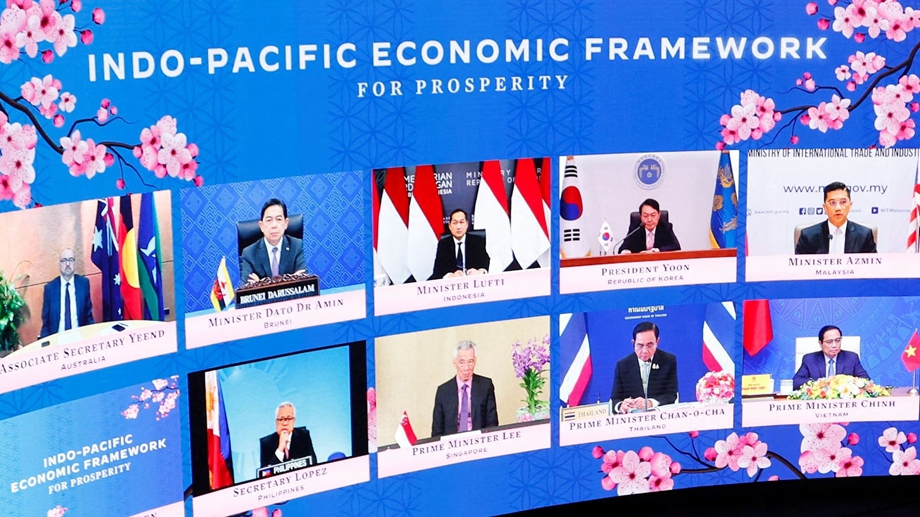Eric's Insight: IPEF omens poorly to regional economy
The US-proposed IPEF is divisive and unlucky in nature
The US president Joe Biden had an alliance-boosting tour to the Asian countries of Japan and South Korea in late May, unveiling the Indo-Pacific Economic Framework (IPEF) and highlighting China as a tacit participant.
Actually, the past month has seen the American diplomats and politicians busy with fanning waves of disorder in the Indo-Pacific oceans, with the ASEAN leaders dragged to Washington D.C. first for a ASEAN-US summit in early May.
The ASEAN-US summit served as a warm-up of unveiling the IPEF, which was first mentioned by Biden at the East Asia Summit in October 2021. The ensuing public opinion had it that the IPEF is to counter the overwhelming Chinese economic activities in the region, while boosting the US hub-and-spokes alliance system.

Launch of the IPEF in Japan on May 23 (Photo/Agencies)
Saving Myanmar, Laos and Cambodia, the remaining seven ASEAN countries joined in the IPEF out of their own evaluations of national interests and orientations of foreign policy.
Vietnam and the Philippines’s entry into the American framework might be relevant to their policy of balancing Chinese influence with the US capabilities, while Indonesia and Thailand may have participated in the IPEF out of their geo-political location between the Indian Ocean and the Pacific Ocean.
Outwardly, the US has succeeded in dragging most of the ASEAN countries, also China’s most immediate neighbors, into its long-plotted economic framework, but the IPEF did not even grant the participants market access to the US, which is most needed for the developing Asian countries.
Thus, the IPEF membership brings no tangible benefits to the agricultural and manufacturing sectors of the ASEAN nations or India, and it remains to be a lip-service from the US side.
By excluding Myanmar, Laos and Cambodia out of the IPEF, the US side has played a divisive policy against the block, putting a wedge among the ASEAN members, and such US practice has made it harder for ASEAN to be united as one and uphold its centrality in regional affairs.
Moreover, India has proved itself to be a thorny participant in the RCEP marathon negotiations in the past years, and there is no guarantee that India will simply follow the US economic agenda that is designed to contain China, while allowing its farmers to be exposed to fierce competitions from Indonesia or Australia.
For the Chinese side, it will firmly safeguard its development interests via continuing its inclusive and win-win economic cooperation with its neighbors through the Belt and Road Initiative, while increasing the BRI alignment with other national initiatives of the Asian countries.
Some have joked on social media that Biden’s IPEF omens unfortunately for the number of the initiative’s founding members is 13, a biblical allusion of Judas, who is the 13th guest to sit down to the Last Supper and eventually betrayed Jesus.
This rub might have been noted by Biden himself or his White House staff later, and FiJi in the southern Pacific Ocean was dragged into the IPEF arch in a hurry two days later. Thus Fiji served as the teddy bear in a seat to make the number of IPEF guests up to 14!
(The writer Eric Wang Shixue is an English editor with the Mekong News Network based in Kunming, Yunnan province. The view in the article does not necessarily represent that of Yunnan Gateway.)








